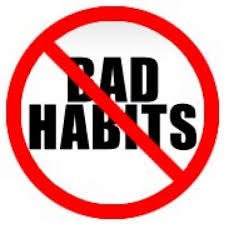Bad habits interrupt your life and prevent you from accomplishing your goals. They jeopardize your health — both mentally and physically. And they waste your time and energy.
So why do we still do them? And most importantly, is there anything you can do about it?
The good news is that yes, there is something you can do to break bad habits. While some people may recommend the Spiritual approach like prayers etc, which i don't forbid, this article will however, consider solutions from the psychological point of view.
Bad habits interrupt your life and prevent you from accomplishing your goals. They jeopardize your health — both mentally and physically. And they waste your time and energy.
Here are the three Simple steps as put together by Webmd of quitting Bad Habit:
Step No.1: Make It Conscious
The first step is to figure out when -- and why -- you bite your nails, crack your knuckles, or engage in any other bad habit. "If you can notice when you are doing it and under what circumstances and what feelings are attached to it, you might be able to figure out why you are doing it and be able to stop.
Step No. 2: Put It in Writing So It Really Sinks In
"Log it," says Janet L. Wolfe, PhD, a clinical psychologist. This will help you establish a baseline, she says. "Put down the antecedents, the emotions surrounding the knuckle cracking and what goes through your head when you crack your knuckles," she says. "This will make your bad habit more conscious."
Wolfe suggests keeping the log for at least a week. The next step is to analyze the data and look at what your usual triggers are. "Do you do it when you are anxious or bored?"
Step No. 3: Bait and Switch
Once you realize when and why you are biting your nails, cracking your knuckles, or engaging in any other bad habit, the next logical step is to find a not-quite-as-annoying temporary or permanent replacement for it.
"If you are a nail biter, try gum," Jaffee says.
"For throat clearing, the competing response may be some sort of slow exhaling because it is impossible to do that and clear your throat at same time," Claiborn says. "Develop a way of breathing whenever you feel the urge to clear your throat. You can see some changes in a very short period of time. There will be a major reduction in throat clearing within days."
If knuckle cracking is your way of coping with stress, Wolfe, says, "Try getting your hands in a position where you won't be able to crack your knuckles. Or stroke the fabric of your sleeve, doodle, or do something else with your hands."
Meditation may also help break bad habits, she adds. Once you have identified the triggers, you can do meditation to distract yourself next time you are in a trigger situation.
Go try these steps and free yourself from that bondage and dirty habits. Shalom!






0 Comments
COMMENT
------------------
We love to hear from you, make use of the comment field after every post and drop your comments. Also tick the box in the comments area to get notified via your email for the replies on your comments. Thanks
DISCLAIMER:
*Comments on this Web are NOT posted by Tundegold.
*Readers are SOLELY responsible for the comments they post.
*Also, where necessary, all posts are duly referenced.Thank you.
COPYRIGHT WARNING!
We work really hard and put a lot of effort and resources into our content, providing our readers with plagiarism-free articles, original and high-quality texts.
Contents on this website may not be copied, republished, reproduced, redistributed either in whole or in part without due permission or acknowledgement. Proper acknowledgement include, but not limited to (a) Proper referencing in the case of usage in research, magazine, brochure, or academic purposes, (b)"FAIR USE" in the case of re-publication on online media.
About possible consequences you can read here:What are the consequences of copyright infringement?
Tundegold is a property of Grandunicorn Limited and we have all legal actions at our disposal to take within and outside the internet in effort to protect our intellectual properties. All contents are protected by the Digital Millennium Copyright Act 1996 (DMCA).